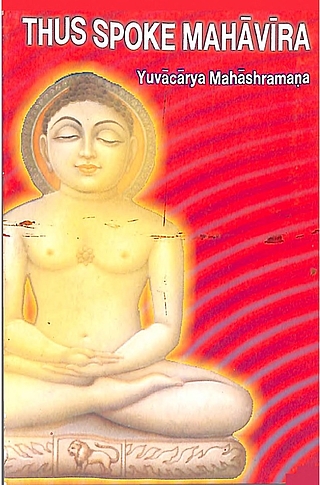(61) जीववहो अप्पवहो
जीवदया होदि अप्पणो हु दया ।
विसंकटओव्व हिंसा,
परिहरिदव्वा तदो होदि।।
jīvavaho appavaho
jīvadayā hodi appaṇo hu dayā
visaṁkaṭaova hiṁsā
pariharidavvā tado hodi.
To kill any living being amounts to killing one self. Compassion to others is compassion to one’s own self. Therefore one should avoid violence like poison and thorn.
(62) हत्थसंजए पायसंजए,
वायसंजए संजइंदिए।
अज्झप्परए सुसमाहियप्पा,
सुत्तत्थं च वियाणई जे स भिक्खू।।
hatthasaṁjae pāyasaṁjae
vāyasaṁjae saṁjaiṁdie
ajjhapparae susamāhiyappā
suttatthaṁ ca viyāṇaī je sa bhikkhū.
Only that one can be a monk who has restrained hands, feet, speech, senses and engrossed in spirituality, fully absorbed in meditation knowing well the aphorism and its real meaning.
(63)सम्मं मे सव्वभूदेसु,
वेरं मज्झ ण केणवि ।
आसाए वोसरित्ताणं,
समाहिं पडिवज्जए।।
sammaṁ me savvabhūdesu
veraṁ majjha ṇa keṇavi
āsāe vosarittāṇaṁ
samāhiṁ paḍivajjae.
Let me treat all living being with equanimity and none with enmity. Let me attain tranquillity by becoming free from expectations.
(64) सव्वभूयप्पभूयस्स,
सम्मं भूयाइ पासओ ।
पिहियासवस्स दंतस्स,
पावं कम्मं न बंधई ।।
savvabhūyappabhūyassa
sammaṁ bhūyāī pāsao
pihiyāsavassa daṁtassa
pāvaṁ kammaṁ na baṁdahī.
One does not undergo the Bondage of demerits if-
(a) One considers all the beings like one's own soul
(b) One sees all the beings with enlightened view point
(c) One inhibits the flow of Karmic matter.
(d) One who has conquered his mind and senses.
(65) जयं चरे यं चिट्ठ
जयमासे जयं सए।
जयं भुंजंतो, भ।संतो
पावं कम्मं न बंधई ।।
jayaṁ care jayaṁciṭṭhe
jayamāse jayaṁ sae
jayaṁ bhuṁjaṁto bhāsaṁto
pāvaṁ kammaṁ na baṁdhaī.
One does not undergo the bondage of demerit if one’s walk is restrained, one’s standing posture is restrained, one’s sitting postur is restrained,one's sleeping posture is restrained and one’s speech is restrained,
(66) पढमं नाणं तओ दया,
एवं चिट्ठइ सव्वसंजए ।
अन्नाणी किं काही?
किं वा नाहिइ छेय पावगं?
paḍhamaṁ nāṇaṁtao dayā
evaṁ ciṭṭhai savvasaṁjae
annāṇīkiṁ kāhī?
kiṁ vā nāhii cheya pāvagaṁ?
It is necessary for all the ascetics to first acquire the knowledge and the practise. What will an ignorant do? How will he differentiate auspiciousness and inauspicious-ness?
(67) जं अन्नाणी कम्मं,
खवेदि भवसयसहस्स कोडीहिं ।
तं णाणी तिहिं गुत्तो,
खवेइ अंतोमुहुत्तेण।।
jaṁ annāṇī kammaṁ
khavedi bhavasayasahassa koḍīhiṁ
taṁ ṇāṇī tihiṁ gutto
khavei aṁtomuhutteṇa.
The unenlightened takes millions of lives to extirpate the effects of karma, whereas a man possessing spiritual knowledge and discipline, obliterates them in a muhūrta (a period of from 2 minute to 48 minutes.)
(68) नाणस्स सव्वस्स पगासणए,
अन्नाणमोहस्स विवज्जणाए।
रागस्स दोसस्स य सखंएणं,
एगंतसोक्खं समुवेइ मोक्खं।।
nāṇassa savvassa pagāsaṇāe
annāṇamohassa vivajjaṇāe
rāgassa dosassa ya saṁkhaeṇaṁ
egaṁtasokkhaṁ samuvei mokkhaṁ.
One can get ecstatic liberation only when
(1) one possesses the light of absolute knowledge.
(2) one has eliminated ignorance and delusion.
(3) one has subsided attachment an aversion.
(69) जेण रागा विरज्जेज्ज,
जेण सेएसु रज्जदि ।
जेण मित्तिं पभावेज्ज,
तं णाणं जिणसासणे।।
jeṇa rāgā virajjejja
jeṇa seesu rajjadi
jeṇa mittiṁ pabhāvejja
taṁ ṇāṇam jiṇasāsaṇe.
That which subdues passions, leads to beatitude and fosters friendliness is called knowledge in the Jain doctrine.
(70) जेण तच्चं विबुज्झेज्ज,
जेण चित्तं णिरुज्झदि ।
जेण अत्ता विबुज्झेज्ज,
तं णाणं जिणसासणे।।
jeṇataccaṁ vibujjhejja
jeṇa cittaṁ ṇirujjhadi
jeṇa attā visujjhejja
taṁ ṇāṇaṁ jiṇasāsaṇe.
With the help of which we can know the truth, control the Mind and purify the soul is called knowledge in the Jain doctrine.
 Yuvacharya Mahashraman
Yuvacharya Mahashraman
